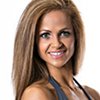You're visiting your family doctor for your yearly check-up, and you're told you have high cholesterol and your blood pressure is slightly elevated. Your doctor looks at you sternly, then proceeds to tell you about dietary changes you need to make and encourages you to exercise. Makes sense, right? Now, imagine that advice came from an overweight doctor who reeked of cigarettes. Would you still hear the advice the same way? If you wouldn't "trust a chubby trainer," would you still trust a chubby doctor?
Unfortunately, this scenario isn't uncommon. Doctors may be experts in their respective specialties, but that doesn't automatically mean they practice what they preach. For many, grabbing a quick, greasy bite at a hospital cafeteria or heading home instead of heading to the weight room is the reality.
But that doesn't mean every stethoscope-wearing MD takes the easy road. Here are six doctors who have risen to the challenge of setting an example for their patients and colleagues. They epitomize health and fitness, and prove that they not only have the expertise, but that they know how to use it.
1
Strong legs for a strong life Jason Itri, MD, PhD
We're constantly bombarded with stories about problems with healthcare in the U.S. One of the leaders trying to improve our healthcare system and make hospitals safer is Dr. Jason Itri. Over the last decade, he's been a major force behind quality improvement initiatives aimed at reducing medical errors. However, his knack for identifying a problem and facing it head-on doesn't end at healthcare.
What makes him successful in his quality role is the same thing that makes him successful in the gym: commitment, consistency, and an unrelenting drive for improvement. As the winner of the 2013 Nutrex Lipo-6 Unlimited 90-Day Challenge—an accomplishment that that he jokes didn't escape a single medical student or resident in his radiology department—there's no denying that he's one dedicated doc.
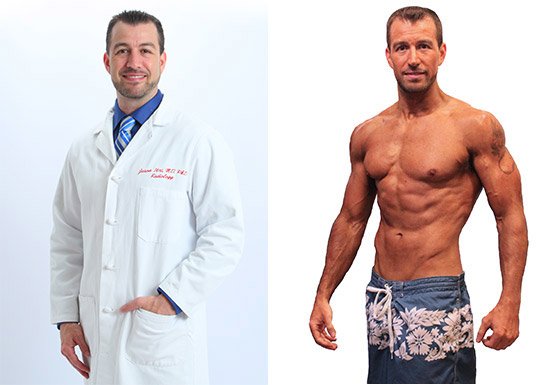
How has being a doctor affected the way you approach fitness?
"I don't make excuses—period. Excuses are a major problem limiting people from achieving their goals. Once you eliminate excuses, you have to answer to yourself and be accountable for your actions.
"I've done the 30-hour overnights shifts, and I've worked 80-hour weeks for months on end. You survive by putting your head down and grinding it out. I use the same approach in the gym. If I'm not exhausted and failing during my sets, I know I need to work harder. Otherwise I'm selling myself short."
Training tip Don't skip leg day
"Too often, I see guys skipping legs, and they look like they had polio as a kid. I believe it's a sign of mental weakness.
"Legs are one of the hardest workouts because your legs are not used to failing—they keep you up all day long without giving out. When you stress them to the point of failure, there's a big-time alarm going to your brain telling you to stop. When you learn to ignore that alarm and keep pushing, you're able to put your entire body through that kind of intense workout and make serious gains.
"My personal favorite is heavy squats. They're a potent stimulator of natural testosterone and growth hormone release. All of your muscles can benefit from blasting legs!"
2
Get Your Mind Right Joseph Drumm, DO
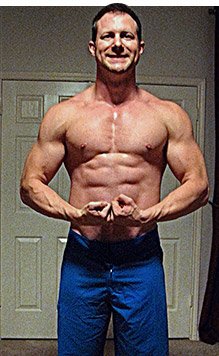
When most people think of psychiatrists, a non-athletic, Frasier-like character probably comes to mind. Dr. Joseph Drumm shatters that stereotype. His success in medicine and fitness are uniquely intertwined, as he has focuses in on the diagnosis and treatment of eating disorders and sports psychiatry, among other specializations.
When his sessions wrap up, Dr. Drumm is also an NPC physique competitor. He's the ultimate fit doctor who can motivate patients whether they're sitting on the exam table or incline bench.
What can the way we work out tell us about our psyche and mental state?
"When a client appears to be unmotivated in the gym, is manifesting poor initiative, and isn't adhering to specified meal or workout plans, the problem often isn't laziness or disinterest, but something deeper.
"For optimal health, we need to focus on improving a patient's physical and mental health alike. To do this, we must demonstrate empathy, supportiveness, accountability, and flexibility. People don't want to be overweight, obese, sluggish, in pain, sad, anxious, irritable, or riddled with disease. In the field of health care, we have the ability and resources to help those who are suffering overcome hurdles.
"Although many patients are resistant to the idea of adopting lifestyle changes, the benefits are immense—not only from tangible measures, but also as preventative medicine. For example, exercise has some antidepressant effects; yoga can allay anxiety; regular sex can improve mood, decrease blood pressure, and [decrease] anxiety; and eating breakfast reduces the risk of becoming obese. The list goes on and on."
Motivation tip Talk to yourself
"Recognize negative self-talk and criticism and, when noted, force yourself to say or think of positives about yourself or the changes you're making. Negativity can become ingrained in us and becomes a default thought process when we feel anxious or stressed. But, just like any habit, this can be broken. It just takes persistent and consistent effort."
3
Healthy Competition Stacey Naito, DO
Dr. Stacey Naito's business is medicine, but her first love was fitness. She attained her BA in Exercise Science before ever going to medical school, and has worked as a fitness trainer for the last two decades, while growing her practice in family medicine.
However, the good doctor's interest in fitness truly blossomed when she began competing in the bikini division of the National Physique Committee (NPC) in 2009. She quickly moved up the ranks and eventually attained IFBB professional status in July 2013 at the NPC Team Universe. Today, she writes for fitness, wellness, and bodybuilding sites, blogs, coaches competitors on the contest circuit, and models regularly.
Her involvement in fitness, coupled with her medical expertise, has provided her with a powerful platform through which to inspire patients and clients to reach their ultimate fitness and wellness goals.
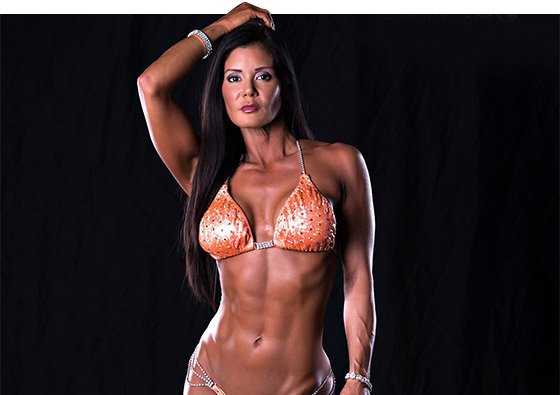
How has being a physician benefited you as a bikini athlete and coach?
"As a physician, I am highly driven to succeed. This drive has translated beautifully into my own training as an IFBB bikini athlete and as a contest prep coach. I know how to erase the T to create 'I can' out of 'I can't,' and motivate my clients and myself to reach goals that are set out.
"My background and experience as a physician has also benefited me by making me keenly aware of what training methods and modalities are safe or unsafe, and when to take heed to the body's alerts with respect to inflammation, injury, and illness. While I'm all for pulling out all the stops and reaching goals, I know that such accomplishments are best achieved with common sense and an awareness of what is best for one's health and well-being."
Fitness tip Make it a lifestyle, not a habit
"The most important advice I can give to anyone who has a demanding career but who wants to become fit is to make fitness an absolute priority. I make my workout sessions and food prep essential parts of my day and never allow myself to slide. Exercise and clean eating simply must occur. There is no alternative for me, and I am now completely accustomed to such a mindset."
4
Back in Action Brian Epstein, DC
Dr. Brian Epstein looks like a man who's always been fit and active, but that wasn't always the case. After being struck by a drunk driver in 2002, he found himself with four herniated disks. He experienced chronic pain and was on medical disability for seven years. But for this successful chiropractor, self-pity wasn't an option.
Instead of letting the unfortunate incident derail him, Dr. Epstein dug deep and found the determination to take his health and fitness back. For him, family was a major motivator. "I was done being a victim," Dr. Epstein says. "I had to make a change for my son's sake. I didn't want him to know me like this."
Once introduced to the world of competitive bodybuilding, Dr. Epstein found his calling.
Using his medical background and his own experiences with chronic pain, he founded the Tri County Pain Management Centers in Philadelphia, where he aims to reach those in similar situations, spread a message of hope, and offer relief to chronic pain sufferers.
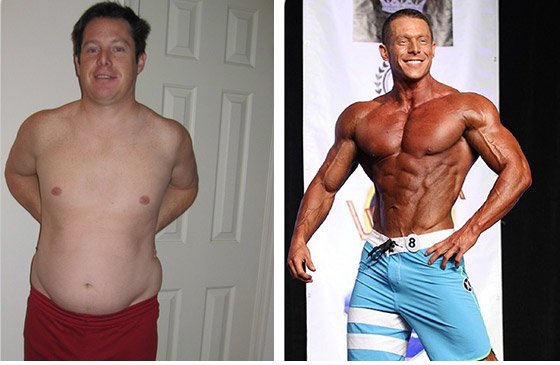
How has your accident affected your outlook on fitness?
"My accident and disability have toughened me up mentally. Having my health back has made me appreciate every single day. I feel blessed and thankful that I am able to compete at the highest level in the world, and I don't take it for granted. I'm 44, and I feel 34. My 30s were robbed from me. I'm taking those years back!"
Training tip Make a strong middle your top priority
"Having multiple herniated discs in my low back leaves me susceptible to frequent exacerbations. I make sure that I keep a very strong core by treating my abs as a regular body part, and I train them for 60-90 minutes twice a week."
5
Elite without Meat Harriet Davis, MD
Dr. Harriet Davis likes to do it all. She's a board-certified family medicine and sports medicine physician with a passion for motivation and making healthy, sustainable behavior changes. She's also a wife, mother and—just for fun— an IFBB pro bikini competitor.
One thing separates her from most of her fellow competitors, though. She's found success as a 100-percent vegan athlete. Dr. Davis shares her knowledge on the meat-free bodybuilding lifestyle on her blog, Vegan Bikini Doc, where she inspires others to find balance in family, fitness, and plant-based nutrition.
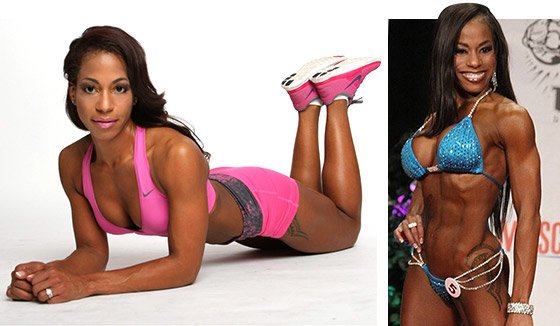
How do you balance your demanding career, family life, and IFBB competition schedule?
"I'm able to balance my career, family life, and fitness goals with the support of my husband and my son. My husband is essentially my manager. He helps me with meal prep and keeps my schedule straight. He is simply amazing! My son is also understanding with regards to my busy schedule. However, he makes sure I make room for 'family time.'
"I also have great support at work. I am the medical director for my practice, and there are times when I need to be away for a competition; my colleagues understand. Just having these systems in place helps relieve a lot of stress, and for that I am truly thankful."
Nutrition and supplementation tip Don't underestimate plants
"People frequently ask me, 'Where do you get your protein?' I get my protein from consuming a well-balanced, plant-based diet that includes nuts, seeds, beans, dark-leafy greens, and legumes. When training for a competition, I use a plant-based protein powder and take a multivitamin, vitamin C, vitamin B12, and L-glutamine, to name a few."
6
Bikini Body in a White Coat Jessica Willett, MD
For California-based family physician Dr. Jessica Willett, being active was never in question. Her parents were coaches and physical education teachers, and Jessica was involved in organized athletics throughout high school and college. After earning her degree in physical education, she moved abroad to teach, and even played on the men's national field hockey team of Cyprus. Working as a health and physical education teacher after college awoke her passion for the human body, and led her to make the decision to pursue a career in medicine.
During her medical school days, Jessica became involved in bodybuilding and stage competitions. While her colleagues struggled with the endless hours, she thrived. In fact, the day of her medical school graduation was also the first time she stepped on stage for her first NPC bikini competition!
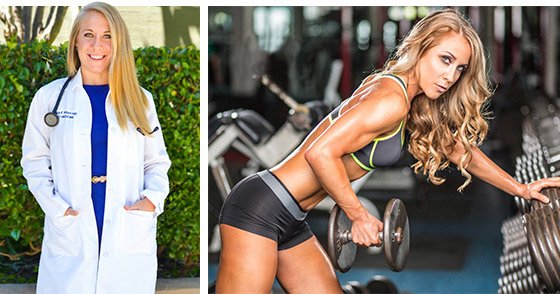
How do you resist the pressure to backslide in your health and fitness?
"Balancing residency life and fitness isn't impossible, but it does involve some work. For me, it means always having a schedule and a plan. I prepare all my meals for the week during my day off so that I always have healthy choices on hand and can reach for one of my prepared meals when I'm at the hospital. I also make sure to always keep a protein bar, a mixable bag of protein powder, or a piece of fruit in the pocket of my white coat so that I have a healthy snack I can eat on the run or between patients.
"Getting my workouts in is tricky, but again it's all about prioritizing. I go to a 24-hour gym so I can work out in the early morning hours, or sometimes in the middle of the night. I also keep a set of resistance bands in my locker at work so that if I am caught there overnight or know that I'll only have a 20-minute break in my day, I can at least get a quick plyometric workout in.
"Although my schedule is still busy and unpredictable, the more I'm able to plan ahead and stay on top of my own health, the better doctor and example I am for my patients."
Nutrition tip Start the day wet
"While you sleep, your body is not taking in fluids, so drinking water as soon as you wake helps ward off dehydration. I like to start my day with one to two liters of water as soon as I wake up. It's a great way to boost your metabolism first thing in the day while flushing out toxins. Water cleanses your colon, making it easier for your body to absorb nutrients. Plus your brain, which is composed mostly of water, works better if it's well-hydrated, giving you a great kick-start to your day!"

